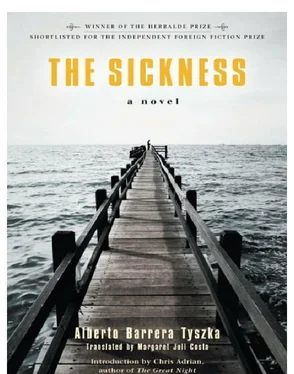His habits changed too. He stopped watching television. He even lost interest in baseball. But sometimes, he would spend hours in silence, staring at the blank screen, watching the faint reflection of his body in the lifeless, opaque glass. Even at moments like that, he didn’t want to think, he wanted just to sit there in the void and let drowsiness and lethargy sweep over him. But that’s not possible. Sooner or later, he has to stop running away, the attempted escape always fails. How would you like to die? Now he thinks that we should all have the right to answer that question.
This evening, while his father is sleeping, the phone suddenly rings. Andrés answers, but the person calling immediately hangs up. When this happens again with exactly the same result, Andrés concludes that this cannot be mere chance. The person ringing doesn’t want to speak to him. He becomes suspicious. His father doesn’t have a service that identifies the caller, and so he can’t even find out where the call came from. Who could it have been? Someone who doesn’t want to speak to him. Why?
A week later, the same thing happens. His father is having a shower. He’s getting steadily weaker, but he still resists being helped by Andrés. It also embarrasses him for his son to see him naked, “like a wet chicken.” The phone rings. Andrés answers, says “Hello,” and immediately the other person hangs up. It happens again. Now, though, Andrés picks up the phone and says nothing. He can almost feel the breathing at the other end, a hesitation wrapped in a breath. It’s only a matter of seconds, but he can touch them, feel them. Then suddenly:
“Is that you?”
Surprise paralyzes him. The woman’s voice disarms him, he doesn’t know what to say. She immediately ends the call. He hears the click of the phone being put down.
“Who was it?” asks his father from the bathroom.
Andrés hesitates before replying. Then, as if testing him out, he says:
“I don’t know. They hung up when they heard my voice.”
“Perhaps it was a wrong number,” says his father softly, after a pause, and without much conviction.
Andrés makes of this possibly unimportant detail an enigma that he tries obsessively to resolve. Mariana even pokes gentle fun at him for this. Perhaps it’s mere coincidence, a banal fact of his father’s day-to-day life. But nothing is the same for Andrés anymore. Or so it seems. He suddenly feels that he has never paid much attention to his father’s private life. He has never known him to have a girlfriend or partner or even a fleeting affair. Nor was he ever very interested. But now, that woman’s voice on the phone has become a source of curiosity: it uncovers all kinds of questions that Andrés has never asked himself, a slice of his father’s life of which he knows nothing. It’s true that Javier Miranda never remarried. He devoted himself entirely to bringing up his son and then, when Andrés got married, he carried on working and cultivated a routine that seemed to have no room for love or sex.
“Your dad has a right to a private life too, you know,” Mariana says. “Perhaps he did have girlfriends, but didn’t want you to find out. There’s no reason why you should know everything.”
But Andrés wants to know everything. He leaves his father with Merny at the hospital for another session of chemo, and goes straight back to the apartment. He wants to poke around, rummage, pry, as if he were a private detective. Javier Miranda’s bedroom is fairly austere. No decorative details. A double bed with blue sheets, two pillows, a wooden bedside table on which there is a lamp, a book, and a remote control for the TV. The book is one Andrés gave him a few weeks ago. The jokey, slightly nostalgic memoirs of a Caracas journalist. It was the only thing Andrés and Mariana thought he might like.
Gray curtains at the windows. A large wardrobe, with two wide doors. Andrés opens them gently, as if not wanting to make any noise. There’s a shelf on which sit three photos: one of Andrés’s mother, one of Andrés and his father crouched together on a beach; the third of Andrés, Mariana, and the grandchildren. The clothes hang there, still and perfect. Andrés opens the drawers and glances inside. At that moment, he feels ashamed, embarrassed. It strikes him as rather ridiculous being there, behind his father’s back, handling things, looking through his father’s underwear, riffling through his shirts. What is he looking for? What does he really want to find? Is it possible to find a life that’s over, that might already be lost to them both?
In the drawer of the bedside table he comes across an envelope stuffed with letters. Again he feels ashamed, dishonest, but he has come too far now, there’s no point in turning back. They are short letters, unsigned, but clearly in a woman’s handwriting. Or so Andrés believes. Besides, the letters themselves tell him this. They appear to be brief declarations of love, either delivered by hand to his mailbox or slipped under the door. No dates, no names, no concrete details. It all seems to indicate a clandestine affair, one that must be kept hidden. One note in particular attracts his attention: it’s written on the back of half a dry-cleaning ticket. Just two lines: “I dropped by this afternoon. I wanted to surprise you. I needed a kiss. I needed you.”
There’s a book in the drawer too: Dying with Dignity by Hans Küng and Walter Jens. Andrés can’t help feeling a slight tremor. Where would his father have got that book? The top right-hand corner of page thirty-five is turned down. That’s as far as he must have got. Perhaps he stopped on that very page last night. Andrés reads the chapter heading: “Euthanasia discussed: the merciful death.” He closes the book and the drawer. The fact that his father has it hidden away in there means that he doesn’t want anyone else to see it. And anyone else means Andrés.
His father and Merny have made a pact. Or, rather, he has imposed a pact on her. They both reached crisis point one afternoon, when they were alone together in the apartment. He was having a really bad reaction to the chemotherapy. The immediate aftereffects were ghastly: he felt dreadful, his blood pressure was low, he was feeling dizzy and nauseous, and he was taking epamin to avoid possible convulsions. He’d had a chemo session earlier that morning. At lunchtime, Merny had served him what the nutritionist had recommended. He ate reluctantly, muttering and protesting.
“It all tastes the same,” he said.
Merny did not respond. She wasn’t having a good day either. Willmer had been out all night. She hadn’t been able to sleep. He’d been behaving oddly for some time, and she knew something was wrong. The neighbors said her son was getting into bad company, that he’d been seen with boys from another barrio.
“Not good,” thought Merny.
Not good meant crack, guns, police, prison, and cemeteries. Willmer finally got in at six in the morning. Merny wanted to slap him, but didn’t dare. Jofre didn’t either. After all, he wasn’t the boy’s father. Willmer went straight to his room, without saying a word, he appeared to be under the influence of drugs. Merny left for work, because she has to work, because she can’t miss a day, because now more than ever she needs money to get Willmer out of the barrio. That’s the only solution. Send him somewhere far away from there. To her sister in the country, for example. That, she thinks, is the only way to save him.
The old man leapt out of bed and ran screaming to the bathroom. He just had time to kneel down by the toilet bowl, but it was too late, he had already vomited his guts up on the way there. The corridor and the bathroom floor were a real mess. In the washbasin, too, there were the remains of his lunch mixed up with other fluids, saliva and dribble, remnants of Javier Miranda’s own body. He stayed hunched over the toilet bowl, trying to withstand the retching. He let out a low roar. Everything the body expels stinks, is disgusting and shameful, repellent leftovers no one wants to see, that should be swiftly cleaned up, covered up, erased. That’s what Merny’s there for.
Читать дальше












